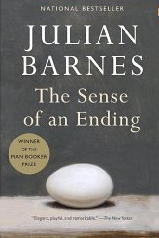Other People’s Dreams
 Barnes, Julian. (2011). The Sense of An Ending. New York: Vintage
Barnes, Julian. (2011). The Sense of An Ending. New York: Vintage
The title is apt. The ending is not fully resolved. It’s only the sense of an ending, and not even well-integrated into the story. Part one of the story tells of a young man, Tony, and his friends and girlfriends during his adolescent school years. In part two, Tony is in his sixties, remembering those early times, and pursuing a woman who he knew back then. The book is a short (161 pp.) meditation on the nature of autobiographical memory.
The writing is competent and straightforward, with Tony as the narrator throughout, mostly first-person, sometimes verging into second-person, addressing the reader directly. Although the diction is not lyrical, the tone is thoughtful and original, and that’s what keeps your eyes moving.
“Some of my contemporaries did VSO, departing to Africa, where they taught schoolkids and built mud walls; I wasn’t so high-minded. Also, back then you somehow assumed that a decent degree would ensure a decent job, sooner or later. ‘Ti-yi-yi-yime is on my side, yes it is,’ I used to yodel, duetting with Mick Jagger as I gyrated alone in my student room” (p.49).
I think the quality of the writing, with its detailed analysis of relationships, is probably what won the novel the Man Booker Prize, because there isn’t a lot else going on. Characters remain sketchy outlines that don’t develop much over time because the focus is entirely on Tony’s memory and he doesn’t know how the others developed after they separated.
Structurally, the main premise of the story is presented in a flawed way. The theme is that memory is a series of vague, unreliable impressions, subject to constant revision and reinterpretation, never an actual record of what happened. That’s a worthwhile observation, if not exactly news. But the narrator throughout is the elder Tony, even in Part One, where the youthful relationships are described in detail. In Part Two, he muses over the accuracy and meaning of those early details. Well, couldn’t he just go back and read Part One for clarification? The premise is set up badly.
I did go back and re-read Part One, and found that key details that could clarify the mysteries in part two were summarized rather than dramatized. In that way, the author purposefully elided key clues. That’s clever, but not honest with the reader, and annoying. I think a writer should never annoy the reader.
On the other hand, perhaps that is the nature of autobiographical memory – we remember that certain key relationships happened, but what were those relationships really like, exactly? It’s impossible to know in retrospect because the person you were then is long gone. One has the sense of having been a ghost moving through one’s early life without leaving footprints. The novel conveys that sense, but I think Part One should have been in the voice of the younger Tony, to make the thesis legitimate and not a writer’s trick.
The writing sags in Part Two, where the elder Tony reviews his bland and beige adult life, and contrasts it with the promise of youth (which was only stereotypically alleged, never described). Finally, he re-initiates contact with Veronica, the love of his youth, who he jilted because she was cold and controlling, and he pursues a confusing email and postal exchange with her until the “sense of an ending.”
It’s a thought-provoking read, but at the end, one is grateful that the story didn’t go on even one page longer, because other people’s memories are about as interesting as other people’s dreams.
